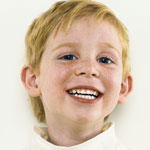Your Child’s Dental Health
Published on
Health Tip of the WeekPublished on
Health Tip of the Week October is Dental Hygiene Month and a good time to take a look at how to help your children develop healthy habits when it comes to their teeth.
October is Dental Hygiene Month and a good time to take a look at how to help your children develop healthy habits when it comes to their teeth.
Your child starts with 20 “baby” teeth. The first set of teeth begins to fall out and make room for adult teeth sometime between the ages of 5 and 8. But baby teeth are just as important as permanent teeth, and they deserve equal care. Primary teeth act as “placeholders” for the adult set. If injury or decay changes the shape of primary teeth, it can affect the position of permanent teeth.
Tooth decay can develop as soon as the baby tooth arrives. Tooth decay can be painful and cause infections, which is why it is important to keep those tiny teeth clean and healthy.
The American Academy of Pediatric Dentistry recommends most children have a dental checkup at least every six months. Some children will need even more frequent visits. A pediatric dentist will:
Contributed by: Patrick S. Pasquariello Jr., MD
Categories: Weekly Health Tips, Dental Health
Are you looking for advice to keep your child healthy and happy? Do you have questions about common childhood illnesses and injuries? Subscribe to our Health Tips newsletter to receive health and wellness tips from the pediatric experts at Children's Hospital of Philadelphia, straight to your inbox. Read some recent tips.